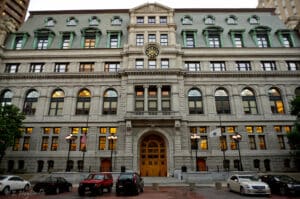
The Adams Courthouse in downtown Boston, home to Massachusetts' Supreme Judicial Court. Photo by Emmanuel Huybrechts | CC BY 2.0
The state Supreme Judicial Court rejected the latest business-backed legal challenge to the blockbuster ballot question asking voters if they support a new surtax on household income above $1 million, ruling Wednesday that the summary Attorney General Maura Healey has prepared for the ballot is fair and suitable to be presented to voters.
The high court’s ruling clears the way for a summary and statements of what a ‘yes’ and ‘no’ vote would do that were prepared by Healey, a surtax supporter who expects to be on the ballot herself as a candidate for governor, to be printed alongside the question when it is put before voters this November. The surtax is estimated to bring in $1.3 billion a year and the text of the amendment calls for the revenue to go towards transportation and education.
Opponents of the surtax proposal argued that the summary and ‘yes’ and ‘no’ vote statements that Healey prepared for Secretary of State William Galvin to include in a voter information booklet and on the November ballot itself were unfair and misleading largely because they do not explicitly state that the legislature retains the ultimate decision-making power over state spending and theoretically could use money the surtax brings in to supplant existing state funding for transportation and education.
Writing for the court, Justice David Lowy stated simply, “We disagree.”
Healey’s summary reads: “This proposed constitutional amendment would establish an additional 4 percent state income tax on that portion of annual taxable income in excess of $1 million. This income level would be adjusted annually, by the same method used for federal income-tax brackets, to reflect increases in the cost of living. Revenues from this tax would be used, subject to appropriation by the state Legislature, for public education, public colleges and universities; and for the repair and maintenance of roads, bridges, and public transportation. The proposed amendment would apply to tax years beginning on or after January 1, 2023.”
Biz Groups Sought Second Win
“This decision is a victory for everyone who wants Massachusetts to be a place where the very rich pay their fair share to make our schools great and our roads and transit safe and efficient,” Fair Share for Massachusetts spokesperson Steve Crawford said. “The ballot’s simple language accurately describes what the Fair Share Amendment will do. The very rich, who now pay a smaller share of their income in taxes than the rest of us, will pay a little more. The money raised is constitutionally guaranteed to be spent on education and transportation to build a stronger economy for all.”
Having successfully kept the so-called Millionaire’s Tax off the ballot in 2018 with a successful legal challenge, Massachusetts High Tech Council President Chris Anderson and a group of state representatives and right-leaning groups lodged a complaint earlier this year that the surtax summary that Healey prepared for voters would misguide them and could lead to “the nightmare scenario of the Constitution being amended based not on the will of the people, but because the people were misled.”
The Coalition to Stop the Tax Hike Amendment, the group of small businesses, chambers of commerce, some of the state’s most influential trade organizations, retirees and concerned citizens that is working to defeat the surtax question, said Wednesday that it “strongly disagrees” with the SJC’s ruling because “the ballot summary fails to explain to Massachusetts voters that revenue from this massive tax hike can be redirected by the Legislature for anything as money is fungible.”
“Because of a loophole in this constitutional amendment, there is no guarantee that money from this huge tax increase would actually increase spending on education and transportation,” anti-surtax campaign spokesman Dan Cence said. “Instead, the politicians who put this on the ballot are giving themselves a blank check to redirect existing funding for education and transportation to their own pet projects, with no accountability.”
The Mass. High Tech Council said that, while it was disappointed in the SJC’s decision, it views its litigation as a success “in an important way: it has revealed, beyond any reasonable dispute, that the Amendment, if adopted by voters, would not require increased spending on education and transportation.”
The lawsuit sought to have the SJC order that ballot materials tell voters that “the Legislature could choose to reduce funding on education and transportation from other sources and replace it with the new surtax revenue because the proposed amendment does not require otherwise.”
When they heard oral arguments on the case last month, the justices zeroed in on the phrase “subject to appropriation by the state Legislature” in Healey’s summary with Justice Scott Kafker suggesting less than two minutes into the presentation from the plaintiffs’ attorney that the phrase indicates that “this could pass and we wouldn’t have the 4 percent actually appropriated, right?”
Why the Suit Lost
In the ruling he wrote, Lowy said the SJC considered two 1992 cases that concerned an initiative petition proposing to raise revenue through excise and channel that revenue into a specific fund to be spent on specific purposes subject to appropriation by the legislature. One dealt with the establishment of a health fund financed by an excise tax on certain tobacco products and the other concerned an excise tax on oil and hazardous material, and in both cases, plaintiffs argued that the attorney general’s summary was misleading by not mentioning that the legislature could spend money differently.
But the SJC ruled in both 1992 cases that the summaries met muster under Article 48 of the Constitution because they closely tracked the language of the proposed amendment by “accurately describing that the revenues were subject to appropriation.” Lowy also wrote that his predecessors on the SJC in 1992 “held that the summaries need not address the plaintiffs’ assertions that the raised revenues could, in theory, be spent by the legislature for non-designated purposes” if the text of the ballot proposal did not expressly address that possibility.
He said that the same reasoning was “equally applicable” in the surtax case before the 2022 edition of the SJC, even though the surtax is proposed as a Constitutional amendment as opposed to the 1992 proposals for new state statutes.
“The proposed amendment does not address how the Legislature may spend monies other than those raised by the amendment. Consequently, the Attorney General’s summary need not opine on whether, as plaintiffs contend, monies that historically have been spent on education and transportation could, at some future point, be spent elsewhere.,” Lowy wrote. “The summary need only describe the amendment itself; we hold that it does so fairly.”
During oral arguments, Lowy questioned whether the phrase “subject to appropriation” was too “inside baseball” and floated the idea that additional summary language explicitly about the legislature’s ultimate appropriating power could be within bounds. He and the SJC more broadly did not pursue that option.
Fiscal Alliance Knocks Ruling
After the court’s ruling was handed down, Mass. Fiscal Alliance spokesman Paul Craney said he was disappointed “that the justices are letting political considerations get in the way of delivering unbiased information to the people of Massachusetts being tasked with making this decision.”
“The language being used to describe the question is extremely leading,” Craney said.
Gov. Charlie Baker, who has been critical of the income surtax and whose budget chief called it a “dangerous policy,” nominated all seven of the high court’s seven justices. Healey supports the surtax and is running for governor this year, leading that race in public opinion polls.
The proposal would shift the state away from the flat income tax rate structure enshrined in the Massachusetts Constitution. If the amendment is approved by voters, the first $1 million of household income would still be taxed at the current 5 percent tax rate and household income above that first $1 million would be taxed at an effective rate of 9 percent. It would add an estimated $1.3 billion in annual revenue for the state, according to a report published this year by the Center for State Policy Analysis at Tufts University.




 |
| 

